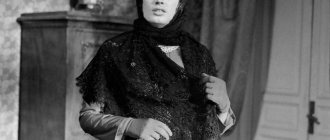How is the problem of conscience revealed in the novel “Crime and Punishment”?
- The problem of conscience: arguments
- The problem of conscience: arguments.
examples from fiction - Are you really human?
- Crime and punishment problem of conscience argument
- Crime and punishment problem of conscience arguments
Attention
Problem of conscience. Unified State Exam essay
The problem of conscience in the novel by F.M.
Dostoevsky's "Crime and Punishment"
Another example: In the essay “The Problem of Conscience,” a student can use arguments from literature that is not included in the school curriculum.
He could read these books on his own.
For example, M. Bulgakov’s novel “The Master and Margarita” also highlights this problem. For the writer, the question of conscience reaches enormous, all-human proportions.
Important
Pontius Pilate, one of the main characters in the work, did not sacrifice his career to save the innocent Yeshua.
Introduction
Throughout the existence of mankind, people have committed crimes that imply that people will be punished. Moreover, punishment consists not only in a court decision, but also in such moral concepts as admission of guilt and remorse. The concepts of crime and punishment are associated not only with the legal concepts of law and responsibility, but also with the concepts of shame, remorse and conscience.
The “eternal theme” of crime and punishment is reflected in many works of art by domestic and foreign writers and playwrights.
The problem of conscience in the novel by F.M. Dostoevsky's "Crime and Punishment"
Gradually, he comes to understand that it is impossible to make the world fairer using evil methods.
Info
After all, cruelty only breeds new cruelty. Sonya Marmeladova helps him come to the idea that a person must change for the better from within.
This is the only way to influence the world around you and other people.
This novel is proof that conscience cannot be silenced. She always knows what is right and what is wrong. All arguments of reason are powerless against conscience. And every person, deep down in his soul, understands that committing evil is a false path.
But Rodion’s pangs of conscience prove that he was not such a bad person as he wanted to show himself.
And in the future he could certainly change for the better. In the end, the main character came to the conclusion that he killed not only the old woman, but also himself, since he went against himself, against his conscience, and finally comes to spiritual rebirth.
- Initially, the main character does not think about conscience at all - he creates a plan.
After some time, the hero’s conscience awakens in the form of his illness.Later and in the form of dreams. He carried out the murder according to plan, but feeling confused, he became even more ill and even delirious. When he thought about everything a little, he felt better. But he saw in everything the suspicion of those around him in his direction - by this Raskolnikov brought himself to a devastating depression. Because of all this, I believed in God. But then the guy realized that these torments cannot be avoided until you admit them - he admitted. It was hard for Rodion in prison, but there he was already able to open his heart to love and even planned how at the age of 32 he would begin a different life.
Works / Dostoevsky F.M. / Crime and punishment / The problem of conscience in the novel by F.M.
Dostoevsky “Crime and Punishment” See also the work “Crime and Punishment”:
Order an essay We will write an excellent essay according to your order in just 24 hours.
A unique essay in a single copy. We bring to your attention a compositional plan for a graduation essay in the Russian language. Calm came to him only when Yeshua himself forgave him and said that there was no execution. M.A. Sholokhov. The epic novel “Quiet Don” The problem of conscience was considered by the author in this immortal work. The main character of the epic, Grigory Melekhov, led the Cossack army during the Civil War. He lost this position because he forbade the Cossacks to engage in robbery and violence. If he took someone else’s food, it was only to eat and feed the horses. Conclusion The problem of conscience has been considered by many authors throughout the existence of Russian literature. If these arguments seem unconvincing to you, then you can independently analyze works of art where writers addressed the problem of conscience:
- M.E. Saltykov-Shchedrin. Fairy tale "Conscience is gone."
M.A. Bulgakov "The Master and Margarita"
In the novel M.A. Bulgakov’s “The Master and Margarita” pays special attention to the actions of the procurator of Judea Pontius Pilate.
Talking with Yeshua Ha-Nozri, who was interrogated because of a denunciation against him, Pontius Pilate is internally convinced that the vagabond philosopher is not guilty. However, fearing for his own career, Pontius Pilate admits the guilt of Yeshua Ha-Nozri, realizing that otherwise he would be removed from office, since Ha-Nozri insulted the sovereign. Pontius Pilate is not ready to go against the law; he is afraid to give up serving the state, although he understands the truth of the words of the vagabond philosopher. Pontius Pilate wants to influence Kaifa, thanks to which Yeshua Ha-Nozri can be released, but he himself does not want to admit the guilt of the accused of the crime. As a result of the decision of Pontius Pilate, Yeshua Ha-Nozri was executed.
The inner experiences of Pontius Pilate do not end after the execution of the vagabond philosopher; on the contrary, they only increase. The procurator of Judea feels guilty and has remorse. Trying to cleanse his soul, he offers Levi Matthew, a student of Yeshua Ha-Nozri, a job, and also secretly arranges the murder of Judas, who betrayed the vagabond philosopher. However, this does not help Pontius Pilate get rid of remorse; he understands that he committed a terrible act because of his cowardice, which he cannot forgive himself.
M.A. Bulgakov shows that for sending Yeshua Ha-Nozri to execution in order to preserve his career, Pontius Pilate is punished by Eternity with a constant feeling of guilt. Pontius Pilate does not forget about Yeshua Ha-Nozri after the guilty decision was made; he remembers him until the end of his life and even after it, in the world of Eternity. For two thousand years, the hero is burdened by his action, considering himself a coward, he repents and dreams of continuing the conversation with the vagabond philosopher. For Pontius Pilate, immortality becomes not a gift that many dream of, but a punishment that was hateful to him. By placing the image of Pontius Pilate in the chapters dedicated to Eternity, M. A. Bulgakov touches on the problem of responsibility for one’s actions and the problem of punishment for crime.
But the author also raises another problem: the problem of forgiveness. The repentant Pontius Pilate turns out to be forgiven by Yeshua Ha-Nozri himself, he is freed from eternal life, which tormented him. M.A. Bulgakov expresses the idea of the importance of repentance for one’s own crime.
Blog
At first, Rodion is not at all affected by the crime he committed.
He is too confident in the correctness of his ideas, confident in his originality and exclusivity. What's wrong with it if he killed? He killed only one “louse, the most useless of all lice.”
When Rodion hears the word “crime,” he shouts back: “Crime! What crime?..
the fact that I killed a nasty, malicious louse, an old pawnbroker, no one needed, who if you kill - forty sins will be forgiven, who sucked the juice out of the poor, and this is a crime? I don’t think about it, and I don’t think about washing it off!” Gradually, Raskolnikov begins to analyze the reasons and give various explanations for his action: “he wanted to become Napoleon,” he longed to help his mother, he was mad and embittered, he rebelled against everyone and everything, and sought to establish his personality.
The hero's conscience begins to torment him. In my opinion, this is natural.
Are you really human?
But, even going to hard labor, Rodion did not lose faith in his own idea. For a long time he worried only because he was not a superman, because his conscience tormented him.
In fact, there was no evidence, and Rodion could have escaped punishment. But the final impetus for recognition was Svidrigailov’s suicide. Svidrigailov is essentially a criminal; he has several ruined lives to his credit.
He believes that everything is allowed to him, that he is superior to others, and in this his position coincides with Raskolnikov’s theory.
Svidrigailov is capable of lying, blackmailing, even killing not for the sake of a great goal, but simply out of boredom, from the emptiness of life.
Awareness of the dead end and hopelessness of such a life leads Svidrigailov to suicide.
This is not only retribution for many sins, but also moral failure.
One more step
I don’t think about it, and I don’t think about washing it off!” Gradually, Raskolnikov begins to analyze the reasons and give various explanations for his action: “he wanted to become Napoleon,” he longed to help his mother, he was mad and embittered, he rebelled against everyone and everything, and sought to establish his personality.
The hero's conscience begins to torment him. In my opinion, this is natural. Raskolnikov violated the moral law that exists in the soul of a person from the moment of his birth. This law is immutable. Those who violate it will face severe moral torment, spiritual and physical destruction. In my opinion, in Raskolnikov’s theory there are thoughts that could only arise in an abnormal person.
Perhaps, if the hero's theory had remained on paper, it would have seemed only a figment of the imagination of a sick person.
Crime and punishment problem of conscience
It is conscience that awakens Raskolnikov’s mind, which was lulled by the theory of “lower and higher people.”
The odious thoughts of the main character did not allow him to soberly assess the situation, so the realization of what happened doubly hit Rodion’s state of mind.
He could not keep the whole truth to himself, but at the same time he was afraid to admit what he had done.
A tormenting conscience drove the hero crazy; it seemed to him that everyone around him knew about the crime, and there was no point in hiding it.
Only Sonya Marmeladova, who, despite her vicious profession, had a completely pure soul, with her advice helped Raskolnikov confess and cleanse himself before God.
But Raskolnikov himself did not always ignore the grief of others. The story with a drunk girl walking past the Neva proves that the character’s soul is still alive and his conscience demands justice.
V.G. Rasputin "Live and Remember"
In the story by V.G. Rasputin's "Live and Remember" shows that Andrei Guskov is committing a war crime. During the Great Patriotic War, the hero goes to war. Having been wounded, Andrei Guskov dreams of returning home, but his superiors decide to return him to the front. Then the hero faces a moral choice: return to the war or go home without permission. As a result, Andrei Guskov chooses the second path.
V.G. Rasputin reveals that Andrei Guskov does not feel guilty about his desertion. When he sees his wife Nastena, he begins to threaten her, because he is afraid that someone will find out that he has returned to his small homeland. Andrei Guskov does not understand how difficult it is for his wife Nastena to hide from other people, in particular from her husband’s parents, the fact of his return, how difficult it is for her to get to the place where Andrei Guskov was hiding. Forbidding Nastena to talk about his return to the parents with whom the heroine lived, forbidding Nastena to admit that she was pregnant with his child, Andrei Guskov behaved like a real egoist who thought only about his existence, without even thinking about the state he was in Nastena.
Andrei Guskov tries to shift responsibility for his own actions, blaming the war for everything, but the author expresses the idea that war cannot serve as a reason for the betrayal of a hero who betrays his Motherland, which needs help and protection, his wife, parents and even himself. V.G. Rasputin reproaches his hero for lack of fortitude, lack of will, and desire to save life by betraying the Motherland, which is faced with difficult times.
The narrative emphasizes that the decision made to desert, which was a war crime, becomes the beginning of the moral decline of Andrei Guskov. From a man, the hero turns into a beast, as indicated by the following details: he learns to howl like a wolf; at the first meeting after Nastena’s return, he sees a werewolf in his husband. It is no coincidence that the author develops the animal nature in Andrei Guskov, this is how V.G.’s position is expressed. Rasputin regarding the hero's actions. The desire to save one’s own life, one’s “skin” at the cost of desertion kills all the best qualities in Andrei Guskov, leaving only an animal in him. The author's position is reflected in the title of the story: here the verdict on Andrei Guskov is traced, a call to remember desertion and betrayal of the Motherland, to remember the crime committed against his own wife, who committed suicide, and an unborn child.
The problem of conscience, crime and punishment Svidrigailov
Send us your works, receive litr's and exchange them for T-shirts, notebooks and pens from Litra.ru! / Works / Dostoevsky F.M.
Crime and punishment / The problem of conscience in the novel by F.M.
Dostoevsky’s “Crime and Punishment” Download essay Type: Problem-thematic analysis of the work The novel “Crime and Punishment” made a very strong impression on me.
F.M. Dostoevsky is a profound philosopher and a subtle psychologist.
He went down in the history of Russian literature as a master of describing the “sick soul.” One of Dostoevsky's most interesting heroes is Rodion Romanovich Raskolnikov, murderer, philosopher, thinker. Pressed down by poverty, embittered by his powerlessness to help his loved ones, Raskolnikov decides to commit a crime - to kill a disgusting old money-lender who benefits from human suffering.
Symbolism
The novel is filled with interesting and at first glance insignificant details and signs that can tell a lot about the meaning of the book.
Raskolnikov's dreams
- Dream about a horse . In it, Rodion, as a little boy, sees a horse being beaten and sympathizes with it, crying bitterly. This episode demonstrates the dual nature of the hero, who wants to kill a person, but at the same time reacts so sharply to the pain of an animal. This is obviously a memory from Raskolnikov's childhood.
- Dream about Africa . The hero sees the beautiful landscapes of an overseas country: golden sand, blue expanse of water, green oasis. This vision represents a contrast with what actually surrounds Rodion. The author introduces this episode to more clearly show the wretchedness of the hero’s existence and emphasize his fantasy, which makes him dream of more and torments him with unfulfilled desires.
- A dream about Ilya Petrovich and the hostess . The policeman beats the landlady of the hero’s apartment, and Rodion himself is afraid of his arrest, but does nothing to avoid it. This dream reveals Raskolnikov's hesitation and his fear of arrest.
- Dream about a laughing old woman . In it, the hero arrives at the scene of a crime and his victim is sleeping, but suddenly wakes up and bursts out laughing. The killer tries to deal with her, but nothing works. As a result, he runs away to the laughter of Alena Ivanovna, and crowds of people scurry around him. They all look at him, but he stops, unable to move on. This passage exposes another fear of the hero - the fear of public repentance and inevitable shame.
- Dream about the end of the world . Raskolnikov sees that the whole world is condemned to death from a pestilence. But only a select few people will survive, this is the hour of judgment on humanity. This dream testifies to the moral cleansing of Rodion’s soul, his readiness for complete repentance.
How the problem of conscience is revealed - crime and punishment
Only the Lord God can decide who is right and who is wrong.
You cannot kill a person, even for great and good purposes.
Life is the most valuable thing we have, and no one has the right to condemn it just like that, at their own whim.
The climactic scene, where the killer himself lists, revises and ultimately rejects all the motives for the crime, is the scene of Raskolnikov’s confession to Sonya.
All the arguments of reason, which seemed so true to him, fall away one after another.
Thus, the novel “Crime and Punishment” helped me understand: you cannot achieve good through murder, even if good is many times greater than evil.
And you will never run away from your conscience. This is the most terrible and fairest judge in the world. In my opinion, inhumane thoughts and deeds cannot serve the good of humanity, no evil can be justified by the happiness of millions of others.
How is the problem of conscience revealed in the novel “Crime and Punishment”?
- The main character, Rodion Raskolnikov, is a poor student with a difficult character, but at the same time he is quite smart. He is constantly haunted by the thought that: why do some people consider themselves better than others, why are they allowed more than others, why are they stronger, why can they do certain things and not ask anyone for an opinion. Raskolnikov eventually comes to the conclusion that these quot;somequot; people simply have more courage, so they take advantage of all the opportunities in this world. And he decided that such quot;supermenquot; can kill other useless people (weak, worthless, cowardly). And this idea gnawed at him for a long time. As a result, Raskolnikov decided to commit a crime - to kill the old pawnbroker. As a result, he hacked her to death with an ax and Alna, the old woman’s sister, also came across.
Having committed the murder, he fled. But then my conscience leaped into my mind. He could not sleep normally, he could not even rest during the day due to obsessive thoughts. His idea of quot;superhumanquot; became torment for him. Raskolnikov began to be tormented by terrible doubts about the correctness of his action: he began to understand that he should not have done all this. Later he meets Sonya, a sweet, kind and merciful girl who also suffers from remorse from working as a prostitute. Raskolnikov told her everything about his terrible act and she pushed him to the point that he had to confess and then it would become easier. As a result, Raskolnikov surrendered to the police, he was sent to hard labor, but in his soul he really felt better. Raskolnikov realized everything, he realized that quot;supermanquot; - this is a story he invented that people should not kill. A person must always remain a person. He repented and, at least by exile, decided to atone for his guilt.
Dostoevsky presented us with the greatest novel of the time quot;Crime and Punishmentquot;
. This is a novel in which human vices, his torments and moral laws are intertwined.
Raskolnikov, the main character of the novel, commits a serious crime, killing an old money-lender. But he believes he is doing this for high reasons. So he wanted to kill the evil that corrupts people. But he was wrong. By killing a person, you cannot kill everything evil on earth. He went the wrong way.
Later, Raskolnikov realizes this, he feels remorse. As a result, he takes the right path of repentance at the end of the novel.
This is how I see the problem of conscience in the novel quot;Crime and Punishmentquot;
.
In one of his letters, Dostoevsky described his novel as “a psychological report of a crime.” Why, having killed two people, is Raskolnikov no longer able to live his usual life, why can’t he calm down, what oppresses and torments him every day and, in the end, forces him to confess? The answer is simple - conscience. It was this that he did not take into account in his calculations. The main character suddenly quite consciously understands that he cannot live like this, that reconciliation with himself is impossible without reconciliation with God. That, having crossed the line, he cut himself off from everything that he loved so painfully, with such anguish. By killing the old pawnbroker and her sister, he killed something in himself, something so valuable and necessary, without which his life would lose all meaning.
And here we are faced with such a phenomenon as Dostoevsky’s humanism. The writer makes it clear: the hero is not lost to society, drawing a parallel with the biblical story of the resurrection of Lazarus, he makes us understand that the revival of Raskolnikov is also possible, but it will happen only when the hero finds the strength to reconcile with God and people .
The main character of this work, Rodion Raskolnikov, decided to kill the harmful and greedy old woman-pawnbroker, who caused only grief to everyone around him. Raskolnikov kills not out of greed, but guided by the thought that the world will be better off without him. That is, he decided to create the fate of people himself, and as a result came to the idea that a strong and powerful personality is allowed everything for the sake of a noble idea.
Then Raskolnikov realized that with this murder he himself had violated the moral law that exists in every person from the very moment of his birth. As a result, he began to experience severe moral torment.
In the end, the main character came to the conclusion that he killed not only the old woman, but also himself, since he went against himself, against his conscience, and finally comes to spiritual rebirth.
Initially, the main character does not think about conscience at all - he creates a plan. After some time, the hero’s conscience awakens in the form of his illness. Later and in the form of dreams.
He carried out the murder according to plan, but feeling confused, he became even more ill and even delirious. When he thought about everything a little, he felt better. But he saw in everything the suspicion of those around him in his direction - by this Raskolnikov brought himself to a devastating depression. Because of all this, I believed in God.
But then the guy realized that these torments cannot be avoided until you admit them - he admitted.
It was hard for Rodion in prison, but there he was already able to open his heart to love and even planned how at the age of 32 he would begin a different life.
Dostoevsky's novel reveals the human aversion to crime, the killing of a living being. The writer deliberately portrays a small and insignificant creature in the role of the victim, but as if to facilitate the hero’s moral insight, he adds into the plot a random victim - Alena Ivanovna’s sister. Who knows if Rodion would have suffered in the same way if there had not been a second victim? But not only murder reveals the problems of a person’s relationship with his conscience. Rodion’s whole life is a continuous torment of conscience, for the crime he committed, for the crimes that others commit, for his powerlessness before the cruelty and vices of the world. Remember Raskolnikov's dreams of an ideal society, an Egyptian oasis of kindness. This is also conscience, its manifestations. Raskolnikov has not forgotten how to sympathize; his crime looks random, but also natural, an attempt to resist the world’s evil, which the hero decides to undertake using unsuitable means. I would like to hope that love at the end of the novel will guide Raskolnikov on the right path, reconcile his conscience with his inner world, and teach him happiness.
Candidate of Philosophy
M. Gorky “Old Woman Izergil”
The theme of crime and punishment is observed in M. Gorky’s story “Old Woman Izergil”.
The author shows that Larra is outside of society, since from birth he was surrounded by only one person - his mother. Larra was raised by his father, an eagle. When the hero and his mother came to the tribe in which Larra’s mother lived before the eagle’s abduction, he demonstrated disrespect for the tribe. Self-confident and proud Larra did not understand the life principles of the tribe’s representatives; he did not respect them. Larra considers herself better than all people.
The conflict between Larra and the tribe escalates when Larra kills her because of the girl’s refusal to be with him. It is the crime against human life that becomes the reason why the tribe decides to punish Larra. The tribe decided what kind of punishment to choose for Larra for a very long time, until they realized that the main punishment for the proud man would be eternal freedom. Since freedom was pleasant for his father, since he was an eagle, for Larra, freedom soon became a punishment, since he was a man. Larra’s existence could not be called real life; his body turned into a shadow. The hero began to dream of death and seek it in every possible way, but people did not want to give him relief from his soul, so they never killed him. The ending of the legend says that Larra was punished for his pride, which was his main crime.
The story says that it was the tribe that punished Larra with freedom. However, Larra was doomed not so much by freedom as by eternal freedom. Larra makes numerous attempts to meet death, but all of them are in vain, since he does not have the opportunity to die. M. Gorky shows that the Universe itself supports the punishment that the representatives of the tribe gave Larra. It is she who prevents Larra from dying of old age; it is with her help that the punishment takes on an eternal character. The story says that when the wisest of the tribe proposed to punish Larra with eternal loneliness, thunder echoed from heaven, as if agreeing with this proposal. This makes us think that the main punishment for a person is not the measures that were taken against him by other people, but the mental suffering that the criminal experiences until the very end of his days.




